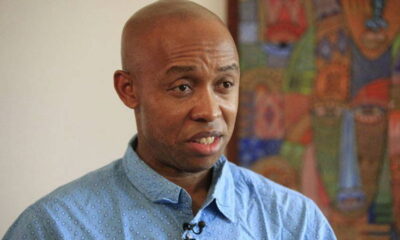Opinion
Zanga-Zanga 2024 and the Russian flag, by Olusegun Adeniyi

For some inexplicable reason, people like to send me ‘accusatory’ messages about journalists and journalism. Even for things that I know nothing about.
It is almost as if they feel I should be held accountable for the entire Nigerian media space.
Three days to the commencement of the nationwide ‘End Bad Governance’ protests, I received one such message from a highly respected person in the North who is very political despite not being involved in partisan politics. I just scrolled through without bothering to respond. But following how the protests eventually panned out in a number of northern cities, I had to go back to the message because I remembered a certain word, ‘zanga zanga’—the meaning of which I didn’t even know until the protests started.
Here was his message: “I don’t know where things stand now regarding the level of mobilisation for this zangazanga. The media have not been providing us with real and periodic assessment of the levels of mobilisation. Nor have they provided us with an analysis of which demographics are for it, and which are against it. As well as to why each demographic holds that view. And they (the media) have not provided us with the foreign dimension to all of this, if any. Some government officials, and pro-government commentators, have alleged foreign involvement. Niger Republic has openly been making inciting remarks, even wishing for a regime change. So, I think the media, generally, have not provided an assessment of the buildup, as it were, to the 1st August commencement of the zangazanga, as proposed. But maybe I just didn’t notice it.”
In the past week, the ‘zanga-zanga’, (Hausa word for street protest or demonstration) has unravelled in northern states, including Kaduna, Borno, Kano and Katsina. Not only with wanton destruction and violence but also with protesters openly calling for military intervention while carrying the Russian flag. It is obvious that the agenda of such people (and their promoters, if any) are at variance with the objective of the organisers of the protest who sought to draw the attention of people in power to the hunger in the country. Now, I can understand why the federal government was agitated in the days preceding the protests. I learnt that some radio commentators in the North were waxing lyrical about how Niger Republic had suddenly become an Eldorado, with the military usurper said to be receiving support for his country from Russia.
The Nigeria-Niger border is 1,608 kilometres long and traverses seven states: Sokoto, Kebbi, Zamfara, Jigawa, Yobe, Katsina and Borno. Since local social media influencers are being contracted to spread pro-Russia propaganda in Africa, I will not be surprised if they also have their foot soldiers in Nigeria. “I manage the cyberwar, the media war… and (the late Wagner leader, Yevgeny) Prigozhin conducts military activities,” Luc Michel, who heads the Russian propaganda machine told the BBC two years ago. “I think that Russia must replace the French in all of Africa.” Nigeria, of course, is not a former French colony but we are too close to one for comfort.
On Tuesday, Governor Uba Sani of Kaduna alluded to that while lamenting the level of carnage in his state. “When you see, particularly children within the ages of nine, 10 and 14 now raising the flag of another country, you will agree with me that it’s well designed, sponsored by some elements who are calling for anarchy in their own country,” Sani said. “They took advantage by using the psychology of those children, knowing fully that here in Northern Nigeria, our people are close to our neighbouring countries, such as Niger Republic, making them to believe that what happened in Niger Republic can happen in Nigeria; what happened in Burkina Faso can happen in Nigeria and what happened in Mali can happen in Nigeria.”
While Sani may have a point on the misguided protesters, he overstated his case with the declaration that “the protest has nothing to do with bad governance or hunger or anything.” The protests may have been hijacked by those with other motives, the fact of hunger in Nigeria is real. Besides, given the dysfunctional system that does not work for the vast majority of our people, rallying a critical mass to the level of ‘constructive dissatisfaction’ with the status quo is not necessarily a bad thing. But having witnessed in Lagos on two occasions how genuine protests can easily be hijacked by hoodlums, I am also always wary about calls for any form of civil disobedience in our country. In the past, I illustrated this point with the message embedded in ‘The Sorcerer’s Apprentice,’ a 1797 poem that tells a compelling story which finishes with the admonition that it is almost always catastrophic to set in motion a force over which one has no control.
In my column last week, I identified six categories to which Nigerians belong regarding the protests. In one of those groups are street urchins, the opportunistic criminals who wait in the hope of a confusion that would allow them to loot and maim. We saw them on full display in Kano, Kaduna and other cities across the country. Of course, I also mentioned those currently in power, especially in Abuja (and beneficiaries) who view the idea of a protest of any kind as ‘treasonable’. Yet, whatever may be our misgivings about street protests or reckless calls for a military coup, a system where public officials feel they should not be held accountable by citizens cannot for long endure. That is what we just witnessed in Bangladesh.
I am delighted that the protests have ended. I also believe the security agencies should fish out all the people involved in violence and looting. Since most of these criminal activities were filmed, perpetrators should not be difficult to fish out. If there are politicians behind the call for military takeover of government, they also should be made to answer for that. But the government must not misread public mood. There is real hunger in Nigeria. And there is also anger about misgovernance.
I find it rather interesting that as an opposition politician, President Bola Tinubu knew all the right things to say. In a statement he personally signed on 29th September 2014, then in his capacity as APC National Leader, Tinubu advocated what he described as a ‘common sense revolution’ in Nigeria. “Today, the nation staggers beneath the weight of trouble multiplied by hardship. Peace and unity seem to have yielded the moment to violence and discord,” Tinubu wrote while attacking the administration of President Goodluck Jonathan. “They do not have a national blueprint or vision. They do have a blueprint and vision for excessive self-enrichment. Their equation is simple: You work, they feast. You toil, they grow fat. You seek a decent wage; they pilfer the collective treasury to enjoy a king’s ransom.”
Today, many people are saying the same about the government Tinubu heads, and it is difficult to fault them. At a time when most Nigerians cannot afford decent meals and millions go to bed on empty stomachs, it rankles that public officials continue to expend scarce resources to service ostentatious lifestyles. Buying expensive vehicles for lawmakers, and a yacht for the president while most governors live like emperors is part of the reason for the anger on the streets. Therefore, to the chief lawbreakers who taunt the people with their irresponsible ‘eating’ habits, I leave them with a story from the master of the craft, the late Professor Chinua Achebe. In a 1989 interview, which has since been published into a book, Achebe told a story which he would, by his own admission, use “again and again because I think it is a marvellous little story.” I have also recounted Achebe’s narration of it before on this page because it addresses leaders at all levels of society who conspire to hold down the people simply to preserve their own personal privilege.
I consider it most fitting for a season such as this in Nigeria. And here goes Achebe: “The snake was riding his horse, coiled up in his saddle. That’s the way the snake rode his horse. And he came down the road and met the toad walking by the roadside. And the toad said to him, ‘Excuse me, Sir, but that’s not how to ride a horse.’ And the snake said, ‘No? Can you show me then?’ And the toad said, ‘Yes, if you would step down, Sir.’ So, the snake came down. The toad jumped into the saddle and sat bolt upright and galloped most elegantly up and down the road. When he came back, he said, ‘That’s how to ride a horse.’ And the snake said, ‘Excellent. Very good. Thank you. Come down, if you don’t mind.’ So, the toad came down, and the snake went up and coiled himself in the saddle as he was used to doing and then said to the toad, ‘It is very good to know, but it is even better to have. What good does excellent horsemanship do to a man without a horse?’ And with that he rode away…”
Achebe provided perspective to the story: “The snake in this story is an aristocrat, and the toad a commoner. The statement, even the rebuke, which the snake issues is, in fact, saying: ‘Keep where you belong. You see, people like me are entitled to horses, and we don’t have to know how to ride. There’s no point in being an expert. That’s not going to help you.’ If you think deeply about this story, it’s a two-edged sword. To put this other edge to it, which is not noticed at first… this other side is that the snake is incompetent, the snake is complacent, the snake is even unattractive. It’s all there in the story, and the time will come in this political system when all this will be questioned. Why is it that a snake is entitled to a horse? Why is it that the man who knows how to ride does not have a horse to ride? This questioning will come in a revolutionary time, and when it comes you don’t need another story. It is the same story that will stand ready to be used; and this to me is the excellence of the griot in creating laughter and hiding what you might call the glint of steel. In the voluminous folds of this laughter, you can catch the hint of a concealed weapon which will be used when the time comes…”
As we have seen from the experiences of other countries, real revolutions don’t come with timetables. They are most often spontaneous and sometimes ignited by seemingly innocuous occurrences. Given the ethno-religious divisions within our society, the prospect of such an upheaval should frighten us. That is why those who are “eating” today should not mock the millions of Nigerians who are going to bed hungry.
Olusegun Adeniyi is a renowned Nigerian journalist and THISDAY newspaper’s columnist.
You can follow him on my X (formerly Twitter) handle, @Olusegunverdict and on www.olusegunadeniyi.com
































